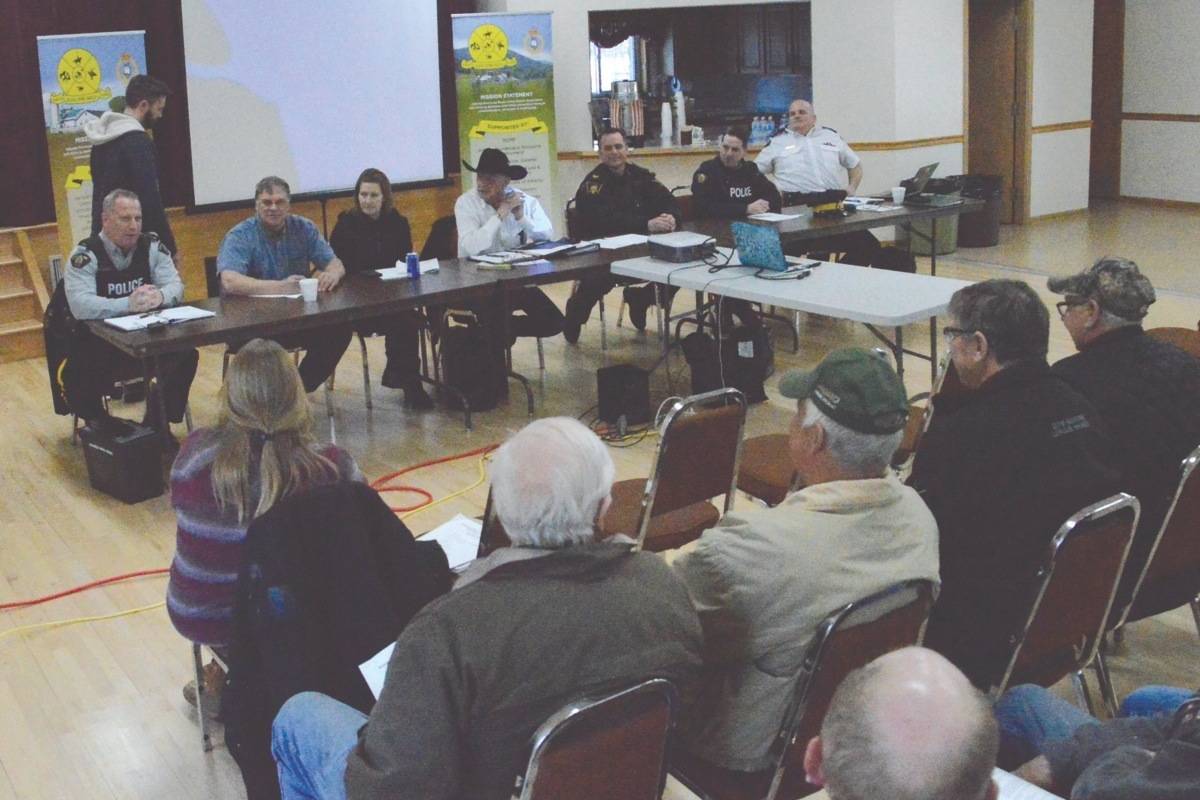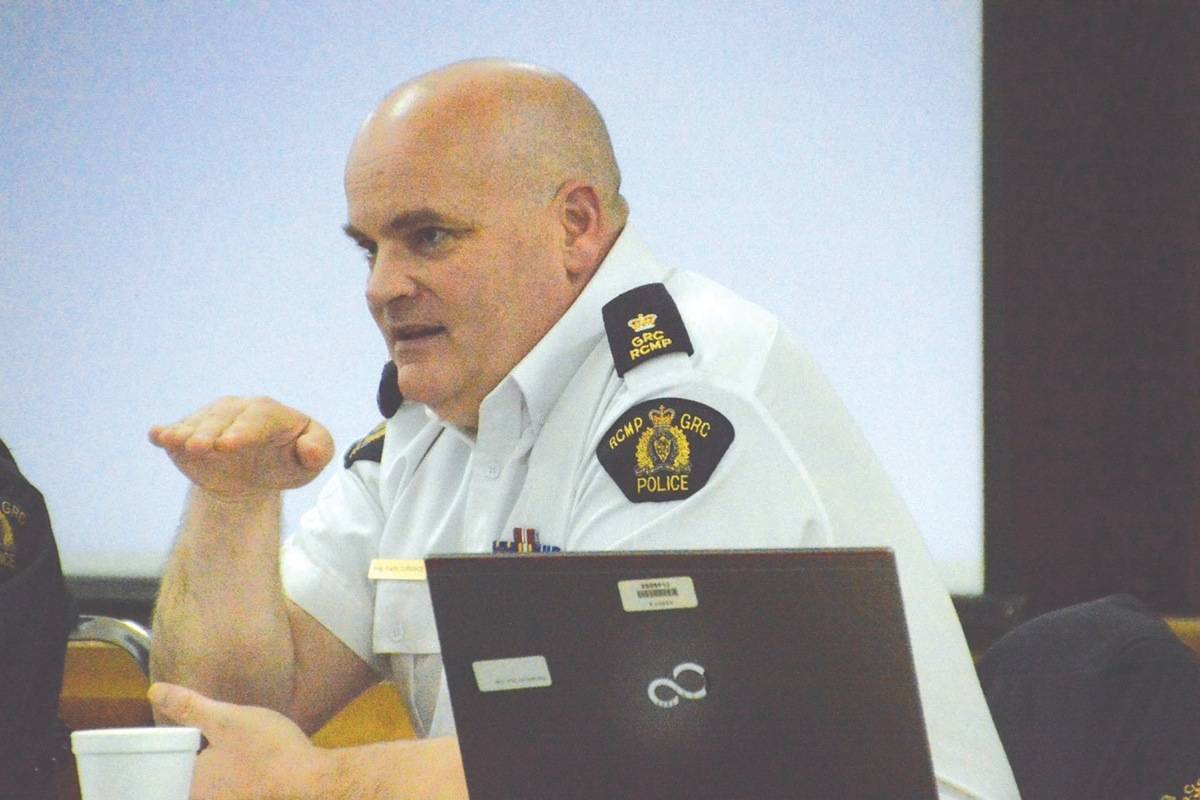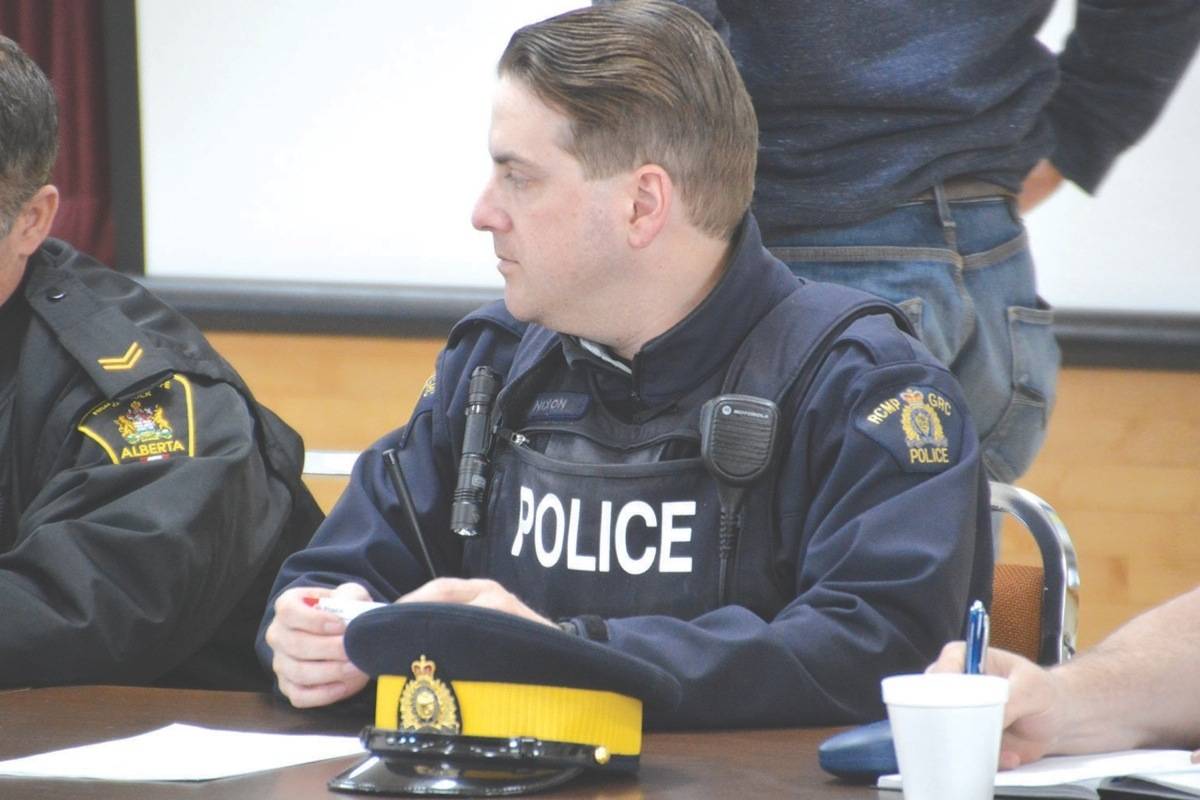The Rosebrier Rural Crime Watch annual general meeting offered Wetaskiwin-area farmers lots of great advice, some of which an RCMP commander referred to as “the elephant in the room.”
Wetaskiwin RCMP commander Insp. Keith Durance, near the end of the rural crime prevention meeting, stated there was a topic police felt obligated to mention, noting many rural residents feel they can defend their own property, possibly with firearms or other violent methods.
Durance said there are lots of reasons not to do this. “Do not put yourself in harm’s way,” said Durance to the full house at Angus Ridge Community Hall Apr. 3. “Those bad guys out there do not care. They are dangerous.”
Durance noted police themselves have had many dangerous encounters arresting suspects as crime has spiked in rural areas.
Trying to prevent crime in your farmyard with a firearm could result in the suspects using that firearm against the property owner. As well, Durance said confronting the suspects could be dangerous too, if they’re in a moving vehicle.
Several rural residents present still stated if they caught suspects on their property stealing stuff, a confrontation, possibly with a firearm, could be an option.
Durance responded that property protection incidents are usually handled on a case-by-case basis, and property owners generally can use force to defend themselves from death or grievous bodily harm. Using violence in other ways could result in being criminally charged.
Rosebrier meeting
The meeting began with a few minutes of AGM formalities, then it was right into addressing the rural crime issue. Present from the RCMP were Durance, Wetaskiwin rural RCMP Cst. Andrew Nixon and Bashaw RCMP detachment commander Sgt. Bruce Holliday.
Holliday began his presentation by stating he just checked all the vehicles parked outside Angus Ridge hall, and about 10 per cent were unlocked. One had shotgun shells sitting in the cup holder.
Holliday said criminals from urban areas know that rural people tend to leave buildings unsecured, gates open and vehicles unlocked. He said that’s the way rural people have done things for generations but have to start making things more difficult for thieves.
“You’ve got to look out for yourselves and look out for your neighbours,” said Holliday.
The sergeant said criminals generally speaking are not sophisticated or particularly energetic. “They’ll go vehicle to vehicle until they find one with the keys in it,” said the sergeant.
As the rural crime wave continues, Holliday said RCMP across Alberta are doing more with less; hence, they need the help of local residents. Holliday also noted a shortage of RCMP members in Alberta. He said local residents can be the eyes and ears of the community by reporting suspicious activity, such as vehicles or people which don’t appear to belong in the neighbourhood.
The sergeant said he feels part of rural police work is getting out into the community and meeting people. “The quickest way to find out what was going on in my community was to talk to people,” said Holliday.
The sergeant said theft of firearms in rural areas is a problem, and it’s because firearms are more commonly found in rural areas. He said a good way for gun owners to help is to keep firearms locked up or fit them with a trigger lock. One resident spoke up and noted though that it’s not always convenient to keep a rifle locked up on the farm.
Holliday said it’s possible in the future that if firearms are left unlocked and they’re stolen then used in a crime, the owner may be held partially responsible.
Inspector’s point of view
Durance spoke next; he noted Wetaskiwin RCMP are responding to plenty of crime in traditional novel ways. He said, for example, Wetaskiwin RCMP recently arrested a home invasion and theft suspect who was allegedly selling a stolen computer on an online classifieds site. The owner notified police, and RCMP impersonated an interested buyer. The suspect showed up at a meeting and was arrested.
The inspector said he’s got 19 years of experience working in the Wetaskiwin region and has been using his experience to both gather from and give advice to the community. He said while crime over the past year or two compared to five or six years ago is much higher, Durance stated he feels crime in the Wetaskiwin region has peaked.
The inspector also pointed out that generally speaking 80 per cent of crime is committed by the same 10 per cent of criminals.
The Alberta RCMP philosophy is to target that eight to 10 per cent through “crime reduction teams.” Durance said police need members to do that and analysts to identify the problem areas and people. Also, Durance said help from the court system is key as well, including things like curfews and release conditions.
The inspector noted detachments from the central region will also be contributing three RCMP officers for crime reduction teams.
But Durance said the public has to play a role in crime prevention too. He noted, in Wetaskiwin rural, 42.5 per cent of stolen vehicles were running with the doors open, while in the city area the number was 39 per cent.
One resident spoke up and asked why Alberta’s justice system is a “catch and release” system. Durance and Holliday both responded that residents can contact their elected officials and tell the MLA or MP what changes they’d like to see in the justice system. Holliday stated that politicians seem interested in the crime issue right now.
One resident asked what would be something effective to ask politicians for. Durance responded his opinion was, “We need to move toward minimum sentencing.” He suggested a minimum two-year jail sentence for using a firearm in a crime.
Another resident asked if guns are more prevalent in crime nowadays. The inspector stated it’s slightly more common, as firearms are involved in roughly 10 per cent of incidents.
One resident, frustrated at the though of thieves on his property, asked how someone can just stand by and do nothing.
Durance responded, “ Call us. We’ll get there.”






